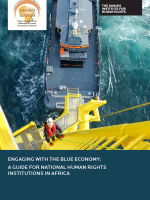
Engaging with the Blue Economy: A Guide for National Human Rights Institutions in Africa
Blue Economy-related policies such as the African Union’s Blue Economy strategy are increasingly presented as important institutional frameworks for the sustainable use of ocean resources for economic growth and improved livelihoods in Africa. Yet, these frameworks have almost exclusively attracted engagement from actors working on the economic and environmental aspects of the Blue Economy. Very few actors have adopted a human rights-based approach to the topic, and National Human Rights Institutions tend to not be attributed a central role in processes related to the Blue Economy.
In light of this gap, this guide on engagement with the Blue Economy was developed to advance an understanding of the concept and how it relates to human rights among National Human Rights Institutions in Africa. Vested with mandates to promote and protect human rights, National Human Rights Institutions are in a unique position to advocate for the fair and equitable distribution of benefits derived from the Blue Economy and the protection of the rights of marginalised and vulnerable groups such as Indigenous and coastal communities, women, children and workers.
The structure of this guide:
- Section 1 introduces the purpose and structure of this guide.
- Section 2 describes the concept of the Blue Economy and provides examples of regional and national policies, institutional frameworks and strategies related to the Blue Economy.
- Section 3 elaborates on the interlinkages between human rights, sustainable development and the Blue Economy.
- Section 4 takes a deep dive into the relation between thematic human rights areas and the Blue Economy.
- Section 5 explains how the mandates of National Human Rights Institutions allow for engagement with the Blue Economy and outlines detailed entry points for engagement.
- Section 6 provides practical recommendations on engagement with the Blue Economy for National Human Rights Institutions.
We strive to make the pdf versions of our publications etc. accessible for screen readers. If you experience any problems, please contact Digital Editor Stine Juhl Nielsen on stni@humanrights.dk
